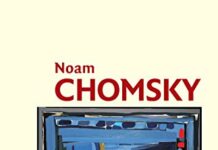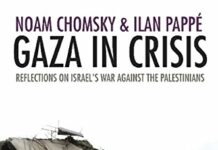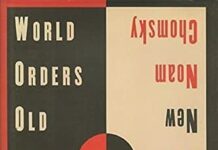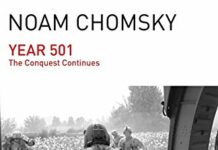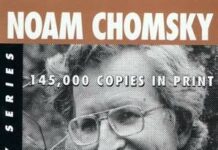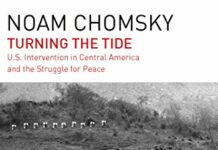
Ebook Info
- Published: 2016
- Number of pages:
- Format: PDF
- File Size: 49.57 MB
- Authors: Noam Chomsky
Description
This scathing critique of US political culture is a brilliant analysis of the Iran-Contra scandal. Chomsky offers a message of hope, reminding us resistance is possible.
User’s Reviews
Editorial Reviews: About the Author Noam Chomsky is Institute Professor in the Department of Linguistics and Philosophy at the Massachusetts Institute of Technology, Boston. A member of the American Academy of Science, he has published widely in both linguistics and current affairs
Reviews from Amazon users which were colected at the time this book was published on the website:
⭐This is Noam Chomsky’s 1998 analysis of the Reagan administration’s failed Central American policy that resulted in the deaths of tens of thousands as well as the destabilization of economies and governments in the name of the protection of the United States from a nonexistent enemy, global communism. Chomsky’s reasoned analysis also shines the light on the complicity of the United States media in failing to report the truth behind America’s illegal and immoral interference with democracy and human rights progressive, popular reforms of the dictatorships who serve our wealthy institutions. It is fascinating to learn how Reagan utilized the threat of terrorism to convince the American public to look the other way while he intervened illegally in the operations of other countries in the name of defense of our way of life that was supposedly threatened by the popular elections in Nicaragua. The same rhetoric now drives the Republican race for the presidency with racially blind hatred of Islam and Hispanics in the name of public and economic safety. See for example Ted Cruz’ popular threat to carpet bomb ISIS in spite of the Geneva Convention and Marco Rubio’s call for massive defense spending to save us from a foe without an airplane or a ship. The tried and true gambit of Reagan’s prevarications is rising again seventeen years after Chomsky’s excellent and prescient analysis.
⭐Chomsky once again holds the mirror up to America and shows how blatantly hypocritical and disingenuous our foreign policy actually is. In this book his primary focus is on the Reagan administration and Central America, where corporate and military interests were promoted at the expense of the indiginous people and “true” democracy. Recent events (the 2000 Bush “coup”, Webb’s book on cocaine and the contras, the Columbia “aid” package, etc.) show how truly relevant this research is. Also, do not let the simpletons of the right and the mainstream (is there really a difference between the two anymore?) critique Chomsky without comment or evidence. His research, unlike theirs (on those rare occasions when they actually engage in true journalism) is meticulously documented and uses their own words and documents as source material. One last thing, if you don’t get this book then get any book from Chomsky on American economic and foreign policy (I recommend his work on Israel and the Palestinians as a particularly contemporary selection).
⭐It has become impossible to write a review of a Chomsky piece without focusing a large content of the review on Chomsky himself (witness … slew of one-star versus five-star reviews of all his books, which often feature personal opinion rather than genuine, responsible argument). Being something of a free-thinker with an interest in politics and psychology, I’ve understandably been drawn toward the debate surrounding Chomsky and his stunning claims about the nature of Western (usually US) policy — and have been very disappointed with the childish nature of that debate, as it has declined hopelessly toward name-calling and a ridiculous skewing of facts and quotes. How does a person know who to believe? (I should reiterate that it really has become a case of “who”, not “what”, as if the merit of an argument has anything to do with its author.)With that state of mind I decided that the best way to get a handle on these astonishing claims about Western policy would be to actually read a book by its most prominent critic. Deciding which book to read wasn’t a problem, since, of the two bookstores and one library in my area, an obscure 1980’s text called “The Culture of Terrorism” was the only of Chomsky’s publications that I could find.The first two chapters, in introducing the main thesis — that, unlike the US government’s claim to “further the cause of democracy” worldwide, the US’s policy is actually to maintain control of as much of the Third World as possible via manipulation of its governmental systems — assume a familiarity with the Iran-Contra dealings and the US invasion of Nicaragua, and, since I was rather ignorant of these matters, at first the book only served to alienate me.But from Chapter 3 onward, the book is a focused exercise in intense — and superior — fact-finding, very effectively discrediting the popular, US media-supported claims that America was doing Nicaragua a favor by funding a guerrilla movement to destroy its government and replace it with a more America-friendly one. The book argues that the Sandinistas, far from being a perfect government, were certainly a step in the right (or, rather, left) direction for Central America — making Nicaragua an intolerable ideological exception to the US’s (unstated) insistence that the world remain effectively owned by businesses and the upper-class, at the terrible expense of poor people’s rights and living conditions. Chomsky provides a thorough and shocking contrast of American media reports of the Central America situation (with even the “respected” media — e.g. the New York Times, Washington Post, etc. — acting as a virtual mouthpiece for US government propaganda) and the disinterested overseas media and human rights groups that reported much more objectively and responsibly on the same incidents.Half the book is about the reality of the US invasions of Nicaragua, while the other half is about how horrendously the submissive domestic media was able to butcher the facts. I found both parts of the book to be extremely well-researched and persuasive — not to mention surprisingly hilarious in parts (nobody writes with more humor about state-sponsored terrorism than Noam Chomsky).Being born in America, and having grown to be very critical and cynical of it, I’m certainly susceptible to the idea — as forwarded by most of Chomsky’s critics — that a major reason for his appeal is not because he is a great historian, but that he provides endless fodder for anti-American views. In other words, for people who call themselves “free thinkers” (as I did above), it becomes tempting to cling to the opinions of like-minded souls, regardless of the fact that their arguments may lack merit. I will allow that, to a certain extent, this phenomenon does apply to me. However, having finished “The Culture of Terrorism”, I returned to the same old websites featuring the same slew of Chomsky-bashing, and tried to find coherent arguments to the effect that Chomsky’s analysis of the US invasion of Nicaragua was anything but dead-on. I could find nothing. For this reason, I should stress that I wholeheartedly enjoyed “The Culture of Terrorism”, I think its conclusions are extremely well-supported, and I have every reason to believe it is a landmark piece of nonfiction. As for other books by Noam Chomsky — I haven’t read them yet, so I’d feel ludicrous if I were to join all the cheering Chomskyheads in claiming that he can do no wrong. I apologize for writing a review that was probably too lengthy, but unfortunately I felt it necessary to emphasize that my complete, unreserved endorsement for this excellent book was actually a recommendation for the book’s argument, not its author. This is a phenomenal study of US domestic and international policies regarding its dealings with Central America in the 1980’s — simple as that.
⭐Noam Chomsky is one of a kind. I read many of his books and this one is a typical Chomsky, frank and brutally honest about the flaws of ‘Western’ global powerplay. Four stars bc many ideas are redundant to his previous books. Also, Chomsky uses iteration to make ideas ‘stick’, which feels a bit lengthy at times. Nevertheless, one should have read at least one book of Chomsky on politics irrespective if one agrees or disagrees with him.
⭐Un livre qui devrait etre obligatoire…si vous ne maitrisez pas parfaitement l’anglais voici une bonne raison de vous y mettre!
⭐
Keywords
Free Download Culture of Terrorism, The in PDF format
Culture of Terrorism, The PDF Free Download
Download Culture of Terrorism, The 2016 PDF Free
Culture of Terrorism, The 2016 PDF Free Download
Download Culture of Terrorism, The PDF
Free Download Ebook Culture of Terrorism, The
